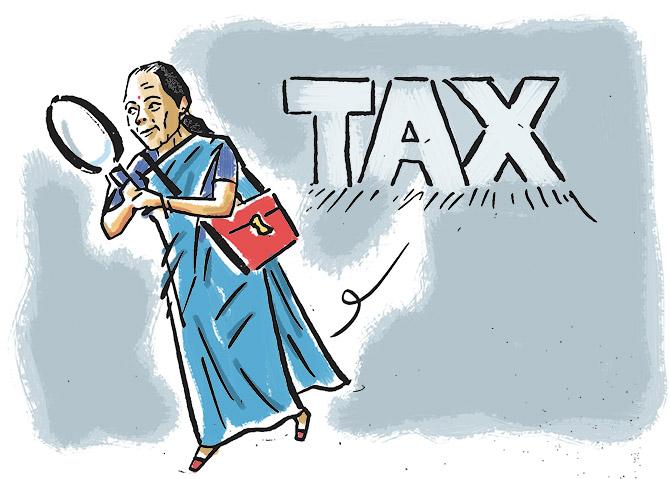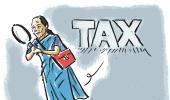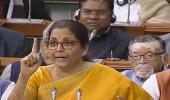Appellants may not lap up the scheme because, first, to do so would amount to admission of guilt, and second, they may have smelled victory before higher appellate forums, notes S Murlidharan.

In her Budget speech on February 1, Finance Minister Nirmala Sitharaman adumbrated the salient features of the Direct Tax Vivad se Vishwas Bill, 2020: Cough up the disputed amount of tax pending in appeals as of January 31, 2020 before any appellate authority, including the high courts and the Supreme Court, on or before March 31, 2020 and avoid the discomfiture and embarrassment of interest and penalty.
As if to entice fence sitters who might miss the deadline, she went on to say that even if they wake up late, they can avail themselves of the scheme, provided they do so on or before the date that would be notified subject to a stiff rider -- 10 per cent of the disputed tax will have to be paid, over and above the disputed tax itself.
The extended deadline perhaps would depend upon the response until March 31, 2020.
If it is tepid, a long rope would perhaps be given, and if it is warm, the resolution window would be kept open for a very short extended duration.
Appeals only against penalty, interest or fees too are sought to be amicably resolved under the scheme -- cough up 25 per cent of them on or before March 31, 2020; else you have to cough up 30 per cent of such amount during the extended duration of the scheme.
About 500,000 cases involving Rs 9 trillion in direct taxes are locked up in litigation at various stages of appeal.
The Federation of Indian Chambers of Commerce and Industry rightly points out that the main lacuna in the scheme is that 100 per cent of the disputed tax has to be paid, unlike under the pre-goods and services tax disputed excise and service tax scheme, where 50 per cent of the disputed tax was waived.
One may quibble over the percentage to be waived.
The truth, however, is that in the absence of a substantial waiver of the disputed tax, people may not evince interest in the scheme, especially in the light of the sobering reality that high-pitched assessment, more often than not, is the root cause of mounting tax litigation.
It is common knowledge that assessing officers, fearing adverse comments from the comptroller and auditor general of India, as well as to worm themselves into the hearts of their superiors, deliberately make outlandish claims on assessees by disallowing even genuine expenses, among other things, only to be ultimately chastised by high courts or the Supreme Court.
The high-pitched assessment menace is so real that the central board of direct taxes itself had to issue a circular warning its officers against such high-handedness.
Against this backdrop, it would be idle to expect appellants to lap up the scheme because, first, to do so would amount to admission of guilt; and second, why should they pay the disputed tax when they are confident of their grounds and smell victory before higher appellate forums? When they win their appeal, the mounting interest and penalty too vapourises.
It is common knowledge that the government is the major litigant and it suffers the mortification of losing 90 per cent of the cases.
There is frenetic speculation in the media, including social media, whether Vodafone and Cairn would smoke the peace pipe with the government and be the catalyst for the success of the scheme by participating in it.
It would be wrong to second-guess what they would do, but there are enough reasons why they will stay away from the scheme.
Remember that Vodafone already stands vindicated by the Supreme Court against the government demand for Rs 11,000 crore as capital gains tax on a transaction consummated in the distant Camay Islands.
In the 2012 Budget, the then finance minister, Pranab Mukherjee, amended the income tax law retrospectively to say that even capital gains (not only business income) would be deemed to arise in India if they had any link with India at all.
Armed with this amendment, the government slapped a fresh tax demand on Vodafone, which is under dispute.
The facts of the Cairns case are similar.
There are legal precedents to show that retrospective amendments cannot be made so as to create fresh tax demands that did not exist or cannot be sustained in the first place.
The short point is that Vodafone perhaps has no reason to blink first, enticed by the prospect of being spared the furiously ticking interest, when all along it has been confident of challenging the retrospective amendment as colorable legislation.
Yet, there may be people willing to participate in the scheme if say 40 to 50 per cent of the contested tax amount is waived, especially if they suspect that they are on a weak wicket.
Cynics would, however, demur, because this is not a general amnesty scheme but targeted at those who have already filed their returns and whose assessments alone are being contested.
When general amnesty schemes (disclosure of black money) fail, with the last-opportunity-to-come-to-the-path-of-rectitude warning being ignored by hardened tax criminals and repeatedly heeded by the clever ones, there is no hope on earth for the government, they aver.
S Murlidharan is a chartered accountant.
Illustration: Dominic Xavier/Rediff.com












 © 2025
© 2025